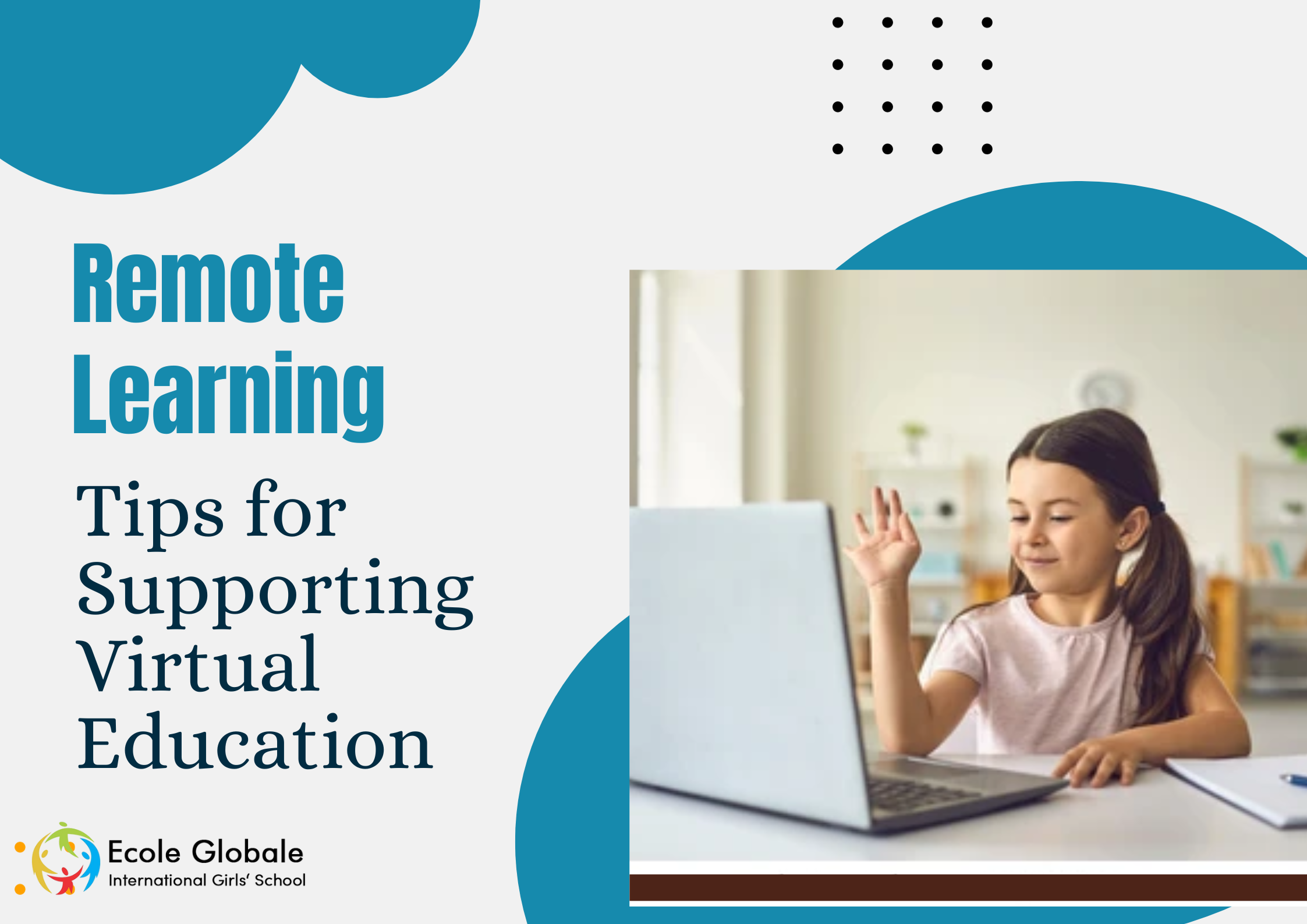As the landscape of education evolves, remote learning has become an integral part of the educational experience. With this shift, parents find themselves playing a crucial role in supporting their children’s virtual education.
This article aims to provide practical tips for parents to ensure remote learning success, acknowledging the challenges and opportunities of this educational paradigm shift.
Creating a Positive Learning Environment for Remote Learning

- Designating a Dedicated Workspace
Establishing a dedicated and distraction-free workspace is one of the first steps toward remote learning success. This space helps simulate a classroom environment and promotes focus. Personalizing the learning area can enhance your child’s sense of ownership and motivation.
- Ensuring Adequate Technology Access
Reliable internet access and appropriate devices are essential for seamless remote learning. Parents should ensure that their children have the necessary tools and software to participate in virtual classes. This includes a reliable internet connection, updated devices, and access to required software.
Establishing Consistent Routines

- Setting Daily Schedules
Mimicking a traditional school day by establishing a consistent daily schedule is vital. This routine helps create a sense of structure and normalcy, making it easier for children to transition between school and home learning. Including breaks for physical activity is equally important for maintaining focus and well-being.
- Encouraging Regular Attendance
Emphasizing the importance of punctuality and regular attendance in virtual classes is crucial. Parents should communicate with teachers about any potential absences and work collaboratively to ensure students are keeping up with their coursework.
Navigating Technology Challenges

- Tech Troubleshooting Strategies
Parents should equip themselves with basic tech troubleshooting skills to address common issues that may arise during remote learning. Collaborating with school tech support ensures that technical challenges are resolved promptly, preventing disruptions to the learning process.
- Promoting Digital Literacy
Fostering digital literacy is an ongoing process. Parents can play a role in teaching online etiquette and responsible internet use. This includes guidance on appropriate behavior during virtual classes, online research skills, and discerning reliable sources of information.
Supporting Academic Engagement

- Actively Participating in Virtual Learning
Parents should actively participate in their child’s virtual learning experience. Joining parent-teacher meetings, monitoring academic progress, and showing interest in the subjects being taught create a supportive educational environment.
- Collaborating with Teachers
Establishing open communication channels with teachers is crucial for remote learning success. Regular communication ensures that parents stay informed about their child’s academic performance and allows for timely intervention if challenges arise. Parents should not hesitate to seek additional resources or support when needed.
Fostering Social Interaction and Emotional Well-being

- Arranging Virtual Social Activities
Social interaction is a vital aspect of a child’s development. Parents can facilitate virtual social activities, such as online group study sessions or organized virtual playdates, to ensure that children continue to connect with their peers despite physical separation.
- Recognizing Signs of Stress and Anxiety
Remote learning can bring about stress and anxiety for children. Parents should be vigilant in recognizing signs of emotional struggles and initiate open discussions about their child’s feelings. Seeking professional support when necessary is crucial for addressing mental health challenges.
Balancing Screen Time and Breaks

- Setting Healthy Screen Time Limits
Establishing healthy screen time limits is essential for preventing digital fatigue. Parents should encourage breaks and non-screen activities to balance the extended periods of virtual learning. Promoting physical and mental well-being through various activities is crucial for maintaining a healthy lifestyle.
- Promoting Physical and Mental Well-being
Incorporating regular exercise and outdoor breaks into the daily routine is vital for supporting physical and mental well-being. Parents can emphasize the importance of relaxation techniques and stress-reducing activities to help children cope with the challenges of remote learning.
Encouraging Self-Directed Learning

- Developing Critical Thinking Skills
Encouraging self-directed learning involves developing critical thinking skills. Parents can foster curiosity and inquiry, allowing children to explore topics independently and develop problem-solving skills. This approach contributes to a love for learning that goes beyond the virtual classroom.
- Fostering a Love for Learning
Connecting lessons to real-life applications and exploring personalized learning paths helps instill a love for learning. Parents can provide resources beyond the standard curriculum, encouraging their children to explore topics of interest and develop a lifelong passion for learning.
Collaborating with Other Parents

- Forming Virtual Parent Support Networks
Parents can form virtual support networks to share tips and strategies. Collaborating with other parents facing similar challenges creates a sense of community and allows for the exchange of valuable insights and emotional support.
- Organizing Virtual Parent Workshops
Organizing virtual parent workshops addresses common challenges and shares best practices for remote learning support. These workshops can cover a range of topics, from effective study habits to managing screen time providing parents with practical tools for supporting their children’s education.
Emphasizing Flexibility and Adaptability

- Adapting to Changing Circumstances
Flexibility is key in the dynamic landscape of remote learning. Parents should recognize the fluid nature of virtual education and be prepared to adapt their strategies based on feedback, evolving circumstances, and their children’s individual needs.
- Encouraging a Positive Attitude
Promoting a positive attitude toward remote learning is essential. Parents can instill a growth mindset in their children, celebrating small achievements and viewing challenges as opportunities for learning and personal development.
Involving Other Family Members in Support

- Coordinating Supportive Roles
Involving other family members, such as siblings and grandparents, in supporting remote learning creates a collaborative learning environment. Shared responsibility for educational support fosters a sense of teamwork within the family.
- Creating a Collaborative Learning Environment
Encouraging family learning activities, where multiple generations participate in educational endeavors, strengthens the sense of collaboration. This can include joint projects, shared reading sessions, or discussions about various subjects.
Leveraging Educational Apps and Resources

- Exploring Interactive Learning Apps
Parents can supplement the school curriculum with interactive learning apps. However, it’s crucial to ensure that the content aligns with educational goals and to monitor usage to maintain a healthy balance.
- Tapping into Online Educational Platforms
Accessing virtual libraries, online learning platforms, and educational videos enriches the learning experience. Parents can explore virtual field trips and other online resources that provide diverse and engaging content to complement their child’s education.
Preparing for Assessments and Examinations

- Developing Effective Study Habits
Parents play a crucial role in helping children develop effective study habits. This includes teaching time management, organization, and creating a revision schedule in preparation for assessments and examinations.
- Providing Emotional Support During Examinations
Managing exam stress is a shared responsibility between parents and children. Parents can provide emotional support, create a conducive study environment, and encourage a healthy perspective on assessments to alleviate anxiety.
Seeking Professional Guidance When Needed

- Identifying Learning Challenges Early On
Parents should be vigilant in identifying signs of learning difficulties early on. Collaborating with teachers and educational specialists helps address learning challenges promptly, ensuring that children receive the support they need.
- Ensuring Adequate Mental Health Support
Accessing school counselors and psychologists is essential for addressing mental health challenges. Parents should actively seek professional support when needed and participate in discussions about their child’s mental well-being.
Celebrating Milestones and Achievements

- Acknowledging Academic Progress
Celebrating academic progress, successful assignments, and projects reinforces a positive attitude toward learning. Parents can acknowledge improvements and effort, fostering a sense of accomplishment in their children.
- Organizing Virtual Celebrations
Despite physical distance, parents can organize virtual celebrations that involve teachers and classmates. Creating a positive atmosphere during virtual celebrations helps maintain a sense of community and connection.
Planning for the Future of Remote Learning

- Embracing the Hybrid Learning Model
As education continues to evolve, parents should prepare for a hybrid learning model that combines elements of in-person and remote education. Adapting to this blended approach ensures that children are well-prepared for future educational challenges.
- Encouraging Lifelong Learning Skills
Instilling a curiosity for continuous learning is a lifelong skill. Parents can encourage their children to view education as an ongoing journey, fostering a love for learning that extends beyond the virtual classroom.
Conclusion
In conclusion, remote learning success requires a collaborative effort between parents, educators, and students.
By creating a positive learning environment, establishing consistent routines, navigating technology challenges, and fostering social interaction, parents play a pivotal role in supporting their children’s virtual education.
Emphasizing flexibility, encouraging a positive attitude, and involving other family members contribute to a holistic and effective approach to remote learning. Leveraging educational apps, preparing for assessments, and seeking professional guidance when needed further enhance the educational experience.
As we plan for the future of remote learning, parents are encouraged to embrace the evolving landscape and instill lifelong learning skills in their children, ensuring they are well-equipped for the challenges and opportunities ahead.









